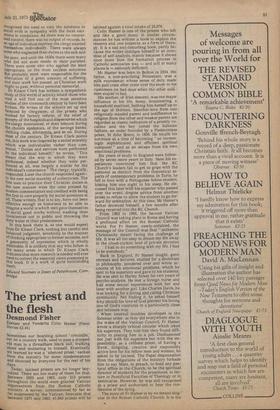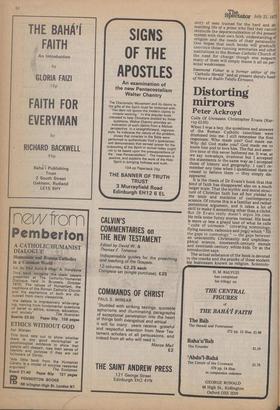The priest and the flesh
Desmond Fisher
Ecstasy and Vendetta Colin Hamer (Peter Davies E2.45) Sometimes our boarding school 'crocodile,' out on a country walk, used to pass a stooped Old man in a threadbare black suit, Walking alone and muttering to himself. Eventually We learned he was a 'silenced priest,' sacked from the ministry for some misdemeanour and shunned by everyone for the rest of his days.
Today, laicised priests are no longer boycotted. There are too many of them for that, Between 1939 and 1963, only 315 priests throughout the world were granted Vatican dispensations from the Roman Catholic ministry. A survey, commissioned by but so far suppressed by the Vatican, forecasts that between 1971 and 1985, 41,840 priests will be laicised against a total intake of 25,976.
Colin Hamer is one of the priests who left and like a good many in similar circumstances he has written a book to explain the reasons and, one suspects, as a form of therapy. It is a sad and disturbing book, partly because the writer indulges himself in an over'dose of self-analysis, mainly because it shows once more how the formation process in Catholic seminaries was — and still in many places is — seriously deficient.
Mr Hamer was born in Bolton in 1934. His father, a non-practising Protestant, was a milk roundsman whose sense of duty made him pull crate after crate over the snow to his customers on bad days when the other men stayed in bed. His mother, of Irish descent, was tne major influence in his life, bossy, domineering, a household martinet, bathing him herself up to the age of thirteen. Smother-love from one religiously-minded parent and indifference to religion from the other and weaker parent are regarded as classic indicators of a priestly vocation and the boy joined the Salesian fathers, an order founded by a Piedmontese priest, St John Bosco, in 1859. He recalls his novitiate as a time of becoming "an increasingly sophisticated and efficient spiritual computer" and as an escape from his own emotional problems.
Six years of study in England were followed by seven more years in Italy. Here his experiences convinced him that the RC Church's leaders fail to get to grips with the personal as distinct from the theoretical as-' pects of contemporary problems. In Turin, he fell in love with a Portuguese fellow-student, kissing him one night in his sleep. He discussed this later with his superior who passed over the event, despite advice from another priest to refuse to allow the student to go forward for ordination. At this time, Mr Hamer's father drowned himself, a few months after being received into the RC Church.
From 1962 to 1966, the Second Vatican Council was taking place in Rome and having a profound affect on the Roman Catholic world. For Fr Hamer, newly-ordained, the message of the Council was that "authentic Christianity meant facing the challenge of life. It was all too easy to dream my life away in the cloud-cuckoo land of private devotion . . . I had to do something with my life. I had to be somebody."
Back in England, Fr Hamer taught, gave retreats and lectures, studied for a doctorate in philosophy, pondered over and wrote accounts of his emotional problems, which he sent to his superiors and gave to his students. He was sent to Harley Street for two years of psycho-analysis. He met a foreign nurse and had some sexual experiences with her and later with another girl. Like Charles Davis, he was looking for a loving and caring Christian community. Not finding it, he asked himself why should his love of God prevent his loving one of God's creatures in a particularly close and intimate way.
When internal troubles developed in the Salesian order, as they did everywhere else in the wake of the Vatican Council, Fr Hamer wrote a sharply critical circular which irked his superiors. They told him they found difficulty in placing him in a job. Disillusioned not just with his superiors but with the im possibility, as a celibate priest, of having a frank, outgoing, creative and responsibly active love for his fellow men and women, he asked to be laicised. The Papal dispensation from the obligations of the ministry forbade him to say Mass, to preach, to hold any pas toral office in the Church, to be the spiritual director of students for the priesthood, to lec ture in Pontificial Faculties of Theology or in seminaries. However, he was still recognised as a priest and authorised to hear the confessions of the dying.
The story of Fr Hamer is by no means singular in the Roman Catholic Church. It is the
story of men trained for the hard and demanding life of a priest who find they cannot reconcile the depersonalisation of the present system with their own faith, understanding of religion and the needs of their personality. One hopes that such books will gradually convince those running seminaries and other institutions in the Roman Catholic Church of the need for change though one suspects many of them will simply blame it all on personal weaknesses.
Desmond Fisher is a former editor of the ' Catholic Herald 'and at present deputy head of News at Radio Telefis Eirreann.































 Previous page
Previous page